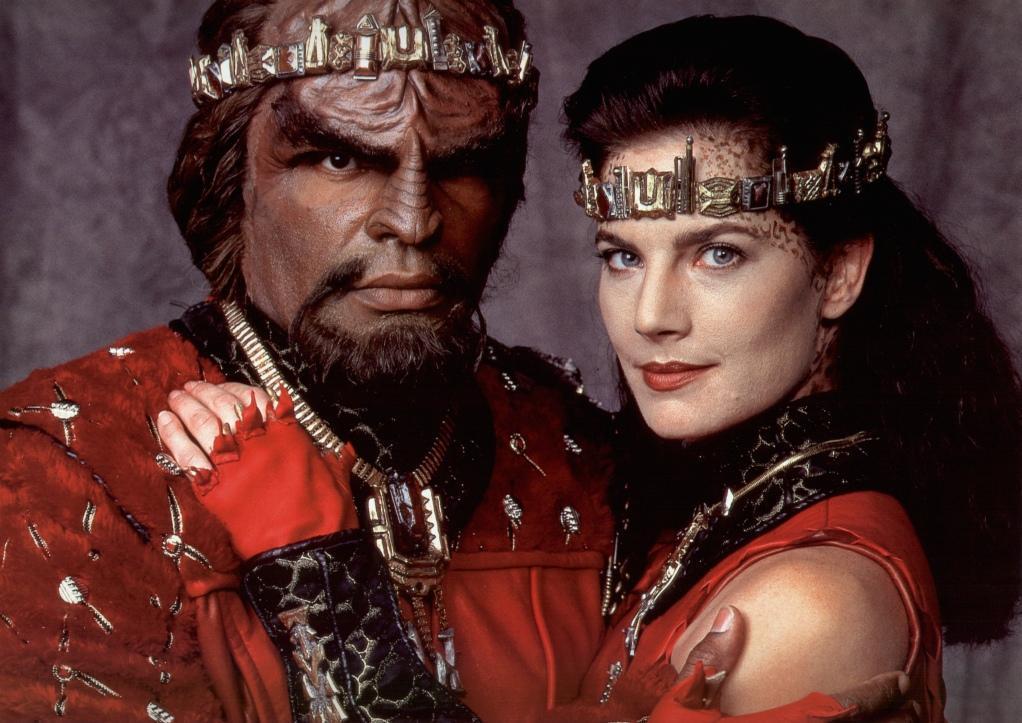The Warrior’s Way
Let’s say you’re having an argument online with a friend about Star Trek.

(c) Paramount Pictures/CBS Studios
Specifically, you’re arguing about the continuity of Worf’s character between Next Generation and Deep Space Nine. Can the Klingon with the bob really be the same character as Dax’s Beau? Is the change between the two natural progression or fundamental shift?
During the course of your argument you both have a plethora of sources to point to to make your cases. There is every episode Worf ever appeared in, but keeping track of each one is a bit overwhelming; it’s too much detail to be valuable.
(c) Paramount Pictures/CBS Studios
There are any and all of the interviews Michael Dorn and the writers of ST:TNG gave about Worf, but it can be hard to know you’ve captured all of them. And if you’re aware of one interview and your friend isn’t and can’t get a copy of it, the interview isn’t helpful for settling the argument.
And then you get an idea: Memory Alpha! You can use the wiki on Memory Alpha to settle any detail dispute you might have during the argument. If it’s on Memory Alpha, it’s agreed to exist; if it isn’t, tough luck. You propose this to your friend and he says that in concept he agrees, but he’s found Memory Aalpha to be spotty source and proposes Wikipedia instead. Wikipedia?? Really?
The disagreement over which source to turn to, Memory Alpha or Wikipedia, is a disagreement over standards. Which is the most accurate source to use when settling disputes over facts? Which should serve as your standard for fairness during the argument?
People agree to solutions in negotiations because those solutions make sense to them; the deal feels fair or reasonable (hopefully both) to each person. So having a standard that both sides feel is reasonable and fair in a negotiation is important. If you can’t agree on a standard during a negotiation, coming up with a solution that you both can get behind is a lot more difficult.
But settling on any standard, for the sake of having a standard, doesn’t cut it. It has to be something that you both think is fair.
So what happens if the other side is insisting on a standard that you don’t think is fair? Or is confusing? Or you’ve never heard of before?
(c) Paramount Pictures/CBS
Ask around. Before you respond with an irritated, “Pshaw; that’s not even real,” ask friends or colleagues if they’ve ever heard of the standard. Your inexperience might be the reason you haven’t run into it yet, or it might be suited for niche work and you wouldn’t have had reason to use it in the past. Better to ask your friend about it than tip your hand to the other side that you don’t know what they’re talking about. Plus, your friend will be able to tell you about the good and bad parts of using the standard, so you’ll be better prepared to use it in your negotiation.
Test it out. If the standard is valid, play around with it a bit to see if you feel comfortable using it. Make up a couple of questions and try to find the answers using the wiki, price index or industry survey that’s being offered as the standard. If you can’t get the hang of it, don’t agree to use it. In negotiations the standard is a tool that both sides have to use. If you can’t use it, it’s not a good tool.
Ask why. Why does the other side want to use this particular thing as the standard? Do they use it often? In what sort of situations? Are those situations like this situation? We all get in habits using tools that are comfortable to us, but sometimes our most trusted tools aren’t right for the job we’re doing. If you don’t know why the other side wants to use this particular standard, you’re missing out on better understanding what that person thinks is important in the negotiation and what they think fair looks like.
Suggest an alternative. Sometimes people just don’t know there are alternatives. So if you think you have a better standard to use in the negotiation, suggest it and explain why you think it fits well with this particular deal. Then listen. And I don’t mean listen for them to take a breath so you can tell them why they’re wrong. Listen to how they respond, the things they talk about when considering your proposal and why they say they like it or they don’t. You’ll learn a lot about what that person wants and what they think fair is. You can use that information to either propose a better standard, or craft an offer that they’re more inclined to accept. If you’re a really good listener you might be able to use the info to do both.
Say no. You’re allowed to say “no” when the other side suggests using a particular standard (you’re actually allowed to say “no” to anything the other side suggests). Because what are they going to do? Force you to use it? How? The standard is the thing that tells us if something is fair and fairness is subjective. So if they insist on using a particular standard when making offers you can say, “You know, I understand what you’re offering, but I don’t see how it’s fair to me. I need a solution that’s going to allow me to [insert your interest here].” Make the conversation about meeting your interests, not about what particular pricing structure to use.
(c) Paramount Pictures
So what about that argument over Worf? Instead of just yelling “Wikipedia!” and “Memory Alpha!” at one another for an extended period of time, create a timeline, together, of the major events of Worf’s life as depicted in a Star Trek episode or movie (books don’t count). Then, as you’re arguing the finer points of this Klingon’s character development, you can consult the timeline you both have ownership of to determine how realistic a particular behavior (kissing Troi; eww) is in context of Worf’s larger history (not frakking likely).
My friend, you’ve just used a standard to help you negotiate. Qapchu’!
Categories: Negotiation Strategy
Tags: practical advice, problem solving, strategy
How I Learned to Stop Worrying and Love the Debt Ceiling Negotiations »




Many clients have to a set of internal and external standards set up after painstaking quality and process analyses and assessment, requiring continuity and alignment. This can happen especially if they can be asked for audit on those for by clients such as government for proof of their practices.
Seems more likely your “opponent” would be apt to find someone who does use their same standards, rather their valuable time negotiating with over a standard that is probably not in their area to negotiate.
I could be off base a bit, but there was too much analogy about Worf and wikis ( and thereby too much alliteration) for there to be a clear understanding of the topic anyway.
You are absolutely right that many clients have standards to which items must conform — websites, software, even communications. Not conforming to those standards when doing work with a client is the fastest way to ensure you won’t get additional work from them.
When talking about standards in negotiation we are talking about something a bit different. In negotiation standards are sources that are used to evaluate whether or not an offer or solution is fair. The Kelley Blue Book for cars is a classic example of a standard — it’s a listing of what price a particular make and model of a car should sell for based on its condition and attributes. It is an independent source for verifying information (like a wiki) or establishing what a standard price is for a type of work. For instance if I were selling you my car, I’d point to the price the Kelley Blue Book publishes for a 2003 Mazda Protege in good condition and use that price to justify my asking price.
I was not clear about the definition of standard I was using and I should have been. Thanks for the question so I could correct my mistake.